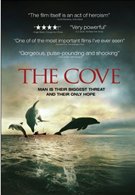I remember when the word "tuna" couldn't be said without the words "dolphin-free" attached. I didn't understand environmentalism then, and thought that canned tuna was one of the more disgusting things on a market shelf. If people are dumb enough to want to eat a dolphin, why should someone stop them? Sympathetic dolphin images and information have bombarded me since, so I sort of understand why people put a stop to it. At least they did from a corporate standpoint, in America. In parts of Japan, though, fisherman and marketers don't give a shit about animal intellect and proper food labeling. Anything without opposable thumbs is considered prey, and the documentary The Cove offers up a rare look at just how pointlessly ravenous the scavenging can get. Richard "Ric" O' Barry is responsible for capturing and handling the dolphins from the old hammy Flipper television series. There are at least two things wrong with this. Though the easily attained riches and popularity drove him early on, the death of one of these dolphins deflated his material greed and heightened his sense of awareness. He became an activist, doing his part to get arrested all the time for freeing dolphins, always eerily silent, letting the propagandized information speak for itself. The award-winning former National Geographic photographer Louie Psihoyos met O'Barry after a conference removed O'Barry as a keynote speaker, and the idea for this film was conceived. They wanted to blow the whistle on the area of Taiji, where seasonal dolphin hunts killed thousands annually; most dolphins are used as mercury-tainted meat, but fortunes are made on survivors sold to aquariums and theme parks.
The premise is solid, and it presents its information in an understated manner meant to draw emotional response. What emotions it draws reside in your stance on the subject matter. A dolphin's intelligence and communication skills give some people reasons to live, while leaving others bored stiff. Personally, I don't think dolphins can offer much to the technological side of the human race, though introspective information can be gleaned handily, I'm sure. One moment in the film chastises the billions spent searching for alien life, when there's so much to find down here. That's the kind of heavily saturated "Moore-ish" sentence I could do without. A second opinion-forker is the preparation and packaging of dolphins as food. The dolphins that aren't picked for show are all "uselessly if not for this one purpose" slaughtered and sent to markets, usually passed off as higher-quality whale meat, or hidden completely in schoolchildren's lunches. Is this worse than how American companies treat cows and chickens, or different from the questionable filling of hot dog skins? No, but there's already a documentary this year about that. And dolphins are somewhat sentient, feel pain, and get stressed. (Enough to get ulcers, even.)
If this film was just a series of fact-trumping and finger-pointing, it would only be informative entertainment. However, The Cove is presented as something of a caper film that leads to a climax of sorts, rather than offering up the same documentary experience so many others do. O'Barry and Psihoyos recruit a couple of other courageous activists to assist in the hands-on work of shining a light on the dolphin killing in Taiji. The "cove" in the title refers to a section of water bordered on three sides by the high land walls of a national park. To say this area is off limits is understating things, and O'Barry's antics are far from the bottom of their watch list. So the group has to illegally infiltrate the...natural landscape...to set up their audio and video equipment in order to document the goings on; video equipment created by Industrial Light & Magic, designed as coastal rocks, placed strategically and hopefully secretively. When that footage is at last shown in full, it's very powerful, thankfully lacking in narration or brow-beating string music.
Except for citizens singled out to represent a population ignorant of the problem, many Japanese people are shown in a harsh light, from the fishermen to those heading whaling committees and other environmental agencies. A picture is painted of a government that uses scare tactics to justify killing off large portions of dolphin sea life. One that gets less developed countries under its wing for support by offering monetary backing. I know a lot of it is propaganda, but it's convincing, and those allowed to defend themselves fail to back themselves up with anything but circular excuses. They're there because they were told to be there. Well, nobody's buying that anymore. Whether you love or abhor animals and animal-rights activists, there is something in The Cove that will move you. I don't know if it's the best documentary of the year, but O'Barry's naked sympathy, and the covert team's courageous efforts to uncover a nation's poisonous ways, make it the rawest and most exciting of those I've seen. The disc itself looks really great, as most do when things are filmed underwater. The handheld and thermal cameras are grainy and spotty, of course, but that doesn't distract you from the amazing things going on in this footage. In the grade-A commentary by director Psihoyos and producer Fisher Stevens you learn that a lot of the on-site and behind-the-scenes footage wasn't even supposed to make it into the film, and was only intended for a making-of feature to accompany it. It sounds completely ludicrous after seeing just how important that footage is to the film. Lots of other interesting facts and "how did they do that" explanations are shared also.
There are a few deleted scenes, most notably an extended look at the surfing protest involving Hayden Panettiere, Isabel Lucas, and Dave Rastovich. There's a small feature on the four different kinds of cameras used in the film and their creations. One of them was illegal to take overseas. Watch out now! There's another small feature about freediving in general, which has some really beautiful footage.
The best feature is "The Cove: Mercury Rising," which is the most important aspect of the movie, for humanity's sake. It pretty much puts a huge warning label on expensive sushi, since much of the high-quality fish coming from Japan is marinated with mercury. It really blew me over with its fishy facts. Great documentary, great special features, great DVD, even though I'm still hungry for a shrimp tempura roll. Here's hoping the "shrimp" documentary is years off.

Nick is a Cajun Country native and an Assistant Managing Editor with a focus on TV and features. His humble origin story with CinemaBlend began all the way back in the pre-streaming era, circa 2009, as a freelancing DVD reviewer and TV recapper. Nick leapfrogged over to the small screen to cover more and more television news and interviews, eventually taking over the section for the current era and covering topics like Yellowstone, The Walking Dead and horror. Born in Louisiana and currently living in Texas — Who Dat Nation over America’s Team all day, all night — Nick spent several years in the hospitality industry, and also worked as a 911 operator. If you ever happened to hear his music or read his comics/short stories, you have his sympathy.
The Accountant 2 Actress Explains How The Original Has Stayed Relevant Long Enough To Get A Sequel
Why Suits LA Has Made Me Cautiously Optimistic About NBC Rebooting Another Classic USA Show
Fans on Reddit Calling Out Khloé Kardashian For Yet Another Over-The-Top Photo Edit After The Actual Shoot Came Up On Hulu Show











